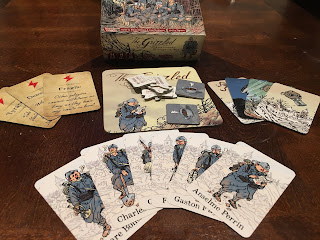Last night I went to a local boardgame group. They meet once a month in a community hall and organise a night of boardgames. I went with my brother-in-law and we met his son-in-law there. We played Lost Ruins of Arnak (Lee won, I came second) and The Grizzled (we all won!) and it was an evening of fun. Would definitely go again.
At the end of the evening there was a raffle and some people won boardgames. Not any of us, but that doesn't matter. One of the players has had a book published and he gave away a signed copy as a prize. The whole event struck me as well organised and the hall was full.
 |
| Lost ruins of Arnak |
Lost Ruins of Arnak is a big-box mix of worker placement, card drafting (similar to Dominion) and trying to get more actions into a turn before passing, with many different strategies to score points. It takes about 30 minutes per player. I've now played it once, but it would need a dozen games to get a feel for the appropriate mix of scoring to use. It seems very unlikely that I will get to play it more than three times in my life, because by then someone will have bought another new game and we'll be playing that instead. So many games come to the table once or maybe twice, in my case that includes Caverna, Tapestry, Wingspan, Wyrmspan, Planet Unknown, Sidereal Confluence, War on Terror and Root. Some of these are probably great games, but I'll never find out because I play with people who buy new games before they've really explored the last new game they bought.
 |
| The Grizzled |
The Grizzled is a short card game, with the players taking the part of French soldiers in the Great War. The goal is to do just enough soldiering to work through the pile of "trials" without becoming overwhelmed by them. It took about 45 minutes to a complete result.
My favourite feature is that the players undertake a mission at the front until it gets too tough, at which point each player in turn gives up and goes back to base; because the soldiers are French, a successful mission is one where all the players give up and go home. Maybe it loses something in translation?
But here's what's been bothering me: what relation are the other two players to me and I to them? Our English terms for relatives are not much help. When I married my wife, her sister became my sister-in-law, and I became her brother-in-law, which is clear enough. But my sister-in-law was already married and her husband became ... what? I've always called him my brother-in-law, although that may overstate the closeness of our relationship. Perhaps he's just my sister-in-law's husband?
My wife's sister has two daughters and the other boardgamer is married to one of them. The daughters are my neices and I'm their uncle (by marriage). But a neice's husband is ... a nephew-in-law? That's not a term in common usage, so I have to either upgrade him to a full nephew or else accept that he's just some guy that I play boardgames with.
It was the same when we visited my wife's first cousin last month; is she my cousin too? We don't have cousins-in-law. And what about the cousin's husband? I get on really well with them, and am happy to just describe them both as our cousins in Wales, but with that nagging feeling that I'm being over-familiar.
Until next time, health & happiness to you all.

No comments:
Post a Comment